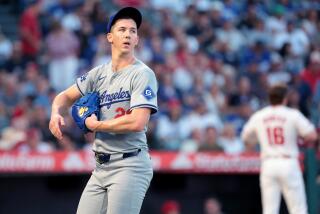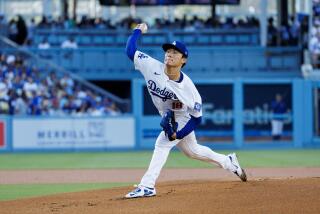Wiggins’ Trade to Orioles Is Finally Completed
SAN DIEGO — San Diego Padres second baseman Alan Wiggins was traded to the Baltimore Orioles Thursday for two minor leaguers, ending what Padre owner Joan Kroc called “one of the hardest and toughest decisions we’ve made.”
More specifically, she termed it “tough love.” Wiggins was someone she said she cared about but someone who had a cocaine problem in 1982 and had been warned not to let it happen again or he’d be off the team. But it did happen again. And, for his good, she said, he had to be disciplined.
Thus the trade.
“Tough love is always hard,” she said. “It’s like if you tell a child they can use the car, but the first time they drive under the influence, you tell them if it happens again they can’t drive again until they’re old enough to buy their own car. You mean what you say. That’s called ‘tough love.’ You love them, but you mean it.”
So, the Padres meant what they said in 1982. Throughout this ordeal, and it lasted 63 days, they said Wiggins would never play again in San Diego. And by saying that, they lost much of Wiggins’ market value, for teams knew they could get him cheaply.
The Orioles did. One of the minor leaguers is Roy Lee Jackson, a 31-year-old right-handed reliever who has been in the New York Mets and Toronto Blue Jays organizations and who will report to the Padre Triple-A affiliate at Las Vegas. The other player will be named later, but sources said he will come from the Double-A level.
Meanwhile, Wiggins, who said “I’m happy to be going someplace where I’m wanted,” will report today to the Orioles’ Triple-A affiliate in Rochester, N.Y. Next Thursday, he will join the Orioles in Kansas City, where they’ll play the Royals. Oriole Manager Earl Weaver said that Wiggins eventually will be the leadoff hitter and starting second baseman.
“He gives us speed and he’s a guy who gets to a lot of balls,” Weaver said.
Said Wiggins: “I’m a major league player, and I’ve proven that. I was not playing for reasons beyond my control. For me to think I wouldn’t play again in the big leagues, that never crossed my mind. It was not a question of ability. I’m just glad to play where I’m wanted.”
He says he is not bitter, words that were somewhat surprising considering Wiggins’ lawyers are bitter. They say this could have ended sooner, and they have called Padre team president Ballard Smith a liar. Smith has called them liars in return.
On Thursday, all Smith said on the matter was: “I don’t want to talk about it anymore. It’s been beaten to death by the media.”
But Wiggins said: “No, I’m not (bitter) at all. Yes, they could’ve done a lot of things sooner. But I didn’t use my energy building up resentments toward them. I had no control over it. They did what they had to do.”
Kroc, when told what Wiggins had said, said, “Oh my,” and added: “That means he’s got a good handle on his sobriety if he has no bitterness. Attitude is 99% of it, you know.”
The Orioles wanted to learn about Wiggins’ frame of mind before they made the deal, and owner Edward Bennett Williams, general manager Hank Peters and psychologist Jim McGee met June 11 with Wiggins in Washington. Peters said he was impressed. So did Wiggins.
The trade talks intensified then. The problem was that the Orioles wantedan out, just in case Wiggins had a relapse. They did agree to pick up his entire four-year, $2.8 million contract, but in the event of a relapse, they can release him and not be fully responsible for his salary. First, he’d have to use up his last 25 days of protection under the Joint Drug Agreement (each player is covered by the agreement for 60 days), and then, if the Orioles don’t want him, they could release him while Wiggins would give up one-third of his salary.
The rest of the money would be paid partly by the Padres and partly by the Orioles. If the relapse occured in Wiggins’ first year in Baltimore, San Diego would pay about 50% of his remaining contract. In the second year, San Diego would pay about 25%. In the third year, it’d be 10%. In the fourth year, the Padres would have no obligations.
Also, the Orioles could decide that they want Wiggins, despite another relapse. If so, they’d have to pay him in full.
“We’re going into this with our eyes wide open,” Peters said. “We feel we’ve been pretty thorough in our evaluation (of Wiggins). We understand the risk and the player understands the risk. But we’re looking at it optimistically.
More to Read
Go beyond the scoreboard
Get the latest on L.A.'s teams in the daily Sports Report newsletter.
You may occasionally receive promotional content from the Los Angeles Times.










